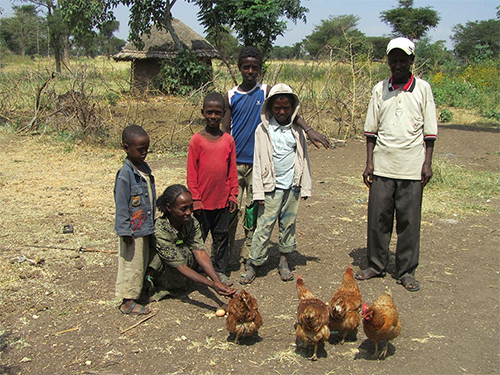 World Council of Credit Unions is the global trade association and development agency for credit unions. The Council has implemented close to 300 technical assistance programs in 71 countries. A recent project in three regions of Ethiopia increased farmers’ incomes by 300 percent:
World Council of Credit Unions is the global trade association and development agency for credit unions. The Council has implemented close to 300 technical assistance programs in 71 countries. A recent project in three regions of Ethiopia increased farmers’ incomes by 300 percent:
World Council of Credit Unions exceeded its targets to improve food security and livelihoods for farming families in Ethiopia through a program that worked with rural savings and credit cooperatives (RuSACCOs) and directly with farmers. The 2009–2014 program was funded by the monetization of 23,000 tons of wheat through USDA’s Food for Progress program.
World Council worked in three regions of Ethiopia—Tigray, Oromia and Amhara—which span half the country, to support RuSACCOs with mobilizing savings and expanding financing for agricultural production. The program also provided non-financial services, such as farmer training and infrastructure investments, to improve farmers’ access to markets and increase commercial food production.
The World Council program was highly successful, helping 44,645 farmers to produce higher crop yields and increase their incomes. The program provided agricultural training to farmers to help transition them from subsistence farming to commercial food production. Soil and water conservation techniques were introduced to a select group of farmers, and 71.5% of surveyed farmers reported that these techniques helped them to increase crop production.
Poor farmers were also supported through the introduction of higher quality agricultural inputs and training on methods such as the proper use of fertilizers and better planting techniques. Thanks to this support from World Council, farmers were able to introduce higher-value and more nutritious crops. By diversifying their crops, they were able to reduce risk and saw a significant increase in overall crop production, income and nutritional intake.
The average income per hectare of land for the selected farmers increased as a result of the technical assistance provided through the project. Improvements made in primary crop production resulted in a 300% increase in income per hectare. The World Council program also introduced irrigation techniques and hand-dug wells that allowed farmers to grow additional secondary crops with lesser dependence on rainfall. Thanks to the program, farmers were better able to survive drought conditions in rural Ethiopia, achieve food security and provide for their families.
World Council worked with 165 community-based RuSACCOs throughout the three target regions to help strengthen them to meet farmer demand for agricultural finance products. World Council implemented a savings mobilization and member campaign, and provided training to RuSACCO management to help boost their skills to better manage their institutions. Through these initiatives, membership in the RuSACCOs grew by more than 350%, and savings grew at an astounding rate of 3,100% from January 2010 to January 2014. The program also provided support to the RuSACCOs in agricultural finance through a revolving loan fund. The gains made in agricultural finance at the 165 RuSACCOs will be sustained through a training-of-trainer approach, with each RuSACCO now having loan officers with agricultural finance expertise. Development officers from the government of Ethiopia will also continue to monitor the RuSACCOs’ performance following the end of the program, helping to support their long-term sustainability.
By the end of the program, both loans and savings per SACCO member had experienced a dramatic increase. On average, savings per member increased by 89%, and loans per member increased by 167%. Through its SACCO strengthening, infrastructure and agricultural training interventions, the World Council program provided support that transformed lives in rural Ethiopia and gave farmers the tools they needed to feed their families. Importantly, these 165 Ethiopian RuSACCOs—as in the case with American credit unions—are self-sustaining financial institutions that will continue to offer and expand agricultural finance, mobilizing savings for the benefit of Ethiopian farmers and their communities.


